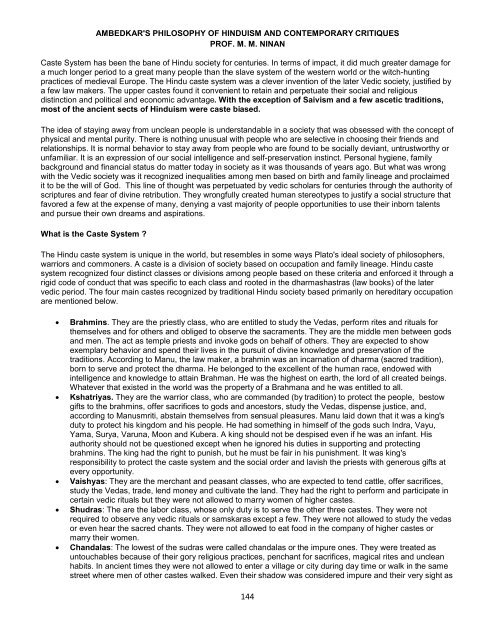Ambedkar-Philosophy of Hinduism
Create successful ePaper yourself
Turn your PDF publications into a flip-book with our unique Google optimized e-Paper software.
AMBEDKAR'S PHILOSOPHY OF HINDUISM AND CONTEMPORARY CRITIQUES<br />
PROF. M. M. NINAN<br />
Caste System has been the bane <strong>of</strong> Hindu society for centuries. In terms <strong>of</strong> impact, it did much greater damage for<br />
a much longer period to a great many people than the slave system <strong>of</strong> the western world or the witch-hunting<br />
practices <strong>of</strong> medieval Europe. The Hindu caste system was a clever invention <strong>of</strong> the later Vedic society, justified by<br />
a few law makers. The upper castes found it convenient to retain and perpetuate their social and religious<br />
distinction and political and economic advantage. With the exception <strong>of</strong> Saivism and a few ascetic traditions,<br />
most <strong>of</strong> the ancient sects <strong>of</strong> <strong>Hinduism</strong> were caste biased.<br />
The idea <strong>of</strong> staying away from unclean people is understandable in a society that was obsessed with the concept <strong>of</strong><br />
physical and mental purity. There is nothing unusual with people who are selective in choosing their friends and<br />
relationships. It is normal behavior to stay away from people who are found to be socially deviant, untrustworthy or<br />
unfamiliar. It is an expression <strong>of</strong> our social intelligence and self-preservation instinct. Personal hygiene, family<br />
background and financial status do matter today in society as it was thousands <strong>of</strong> years ago. But what was wrong<br />
with the Vedic society was it recognized inequalities among men based on birth and family lineage and proclaimed<br />
it to be the will <strong>of</strong> God. This line <strong>of</strong> thought was perpetuated by vedic scholars for centuries through the authority <strong>of</strong><br />
scriptures and fear <strong>of</strong> divine retribution. They wrongfully created human stereotypes to justify a social structure that<br />
favored a few at the expense <strong>of</strong> many, denying a vast majority <strong>of</strong> people opportunities to use their inborn talents<br />
and pursue their own dreams and aspirations.<br />
What is the Caste System ?<br />
The Hindu caste system is unique in the world, but resembles in some ways Plato's ideal society <strong>of</strong> philosophers,<br />
warriors and commoners. A caste is a division <strong>of</strong> society based on occupation and family lineage. Hindu caste<br />
system recognized four distinct classes or divisions among people based on these criteria and enforced it through a<br />
rigid code <strong>of</strong> conduct that was specific to each class and rooted in the dharmashastras (law books) <strong>of</strong> the later<br />
vedic period. The four main castes recognized by traditional Hindu society based primarily on hereditary occupation<br />
are mentioned below.<br />
• Brahmins. They are the priestly class, who are entitled to study the Vedas, perform rites and rituals for<br />
themselves and for others and obliged to observe the sacraments. They are the middle men between gods<br />
and men. The act as temple priests and invoke gods on behalf <strong>of</strong> others. They are expected to show<br />
exemplary behavior and spend their lives in the pursuit <strong>of</strong> divine knowledge and preservation <strong>of</strong> the<br />
traditions. According to Manu, the law maker, a brahmin was an incarnation <strong>of</strong> dharma (sacred tradition),<br />
born to serve and protect the dharma. He belonged to the excellent <strong>of</strong> the human race, endowed with<br />
intelligence and knowledge to attain Brahman. He was the highest on earth, the lord <strong>of</strong> all created beings.<br />
Whatever that existed in the world was the property <strong>of</strong> a Brahmana and he was entitled to all.<br />
• Kshatriyas. They are the warrior class, who are commanded (by tradition) to protect the people, bestow<br />
gifts to the brahmins, <strong>of</strong>fer sacrifices to gods and ancestors, study the Vedas, dispense justice, and,<br />
according to Manusmriti, abstain themselves from sensual pleasures. Manu laid down that it was a king's<br />
duty to protect his kingdom and his people. He had something in himself <strong>of</strong> the gods such Indra, Vayu,<br />
Yama, Surya, Varuna, Moon and Kubera. A king should not be despised even if he was an infant. His<br />
authority should not be questioned except when he ignored his duties in supporting and protecting<br />
brahmins. The king had the right to punish, but he must be fair in his punishment. It was king's<br />
responsibility to protect the caste system and the social order and lavish the priests with generous gifts at<br />
every opportunity.<br />
• Vaishyas: They are the merchant and peasant classes, who are expected to tend cattle, <strong>of</strong>fer sacrifices,<br />
study the Vedas, trade, lend money and cultivate the land. They had the right to perform and participate in<br />
certain vedic rituals but they were not allowed to marry women <strong>of</strong> higher castes.<br />
• Shudras: The are the labor class, whose only duty is to serve the other three castes. They were not<br />
required to observe any vedic rituals or samskaras except a few. They were not allowed to study the vedas<br />
or even hear the sacred chants. They were not allowed to eat food in the company <strong>of</strong> higher castes or<br />
marry their women.<br />
• Chandalas: The lowest <strong>of</strong> the sudras were called chandalas or the impure ones. They were treated as<br />
untouchables because <strong>of</strong> their gory religious practices, penchant for sacrifices, magical rites and unclean<br />
habits. In ancient times they were not allowed to enter a village or city during day time or walk in the same<br />
street where men <strong>of</strong> other castes walked. Even their shadow was considered impure and their very sight as<br />
144


















